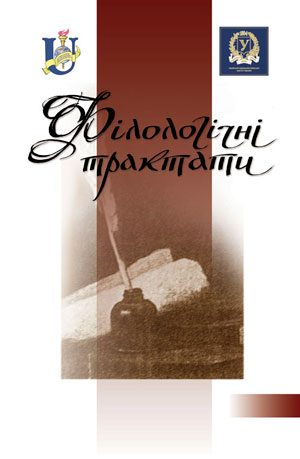WAYS OF GENERATING NEOLOGISMS IN MODERN ENGLISH
Abstract
The article considers the problem of language development, in particular its lexical layer. The rapid development of all areas of modern human life is reflected in the language, the evolution of lexis is not just a change in the vocabulary. The authors study the modern paradigms of neology in terms of a functional approach to language, analyze the factors of the appearance of new words and correlate them with the pragmatic needs of society as a whole and of different social groups in particular. The article presents the pricipal nominative types and models of English-language neologisms over the past decades. Some factors contributing to the replenishment of the English lexical layer regarding the sociolinguistic aspect are given. Social spheres significantly influence the appearance of new words because they shape a person's attitude to the realities of the linguistic picture of the world. The relevance of this research is determined by the insufficient study of the processes of lexical formation, in particular neological units, which are intensively occurring at the current stage of society globalization and require an analysis of the ways of formation and definition of critical concepts that cause the need for the functioning of innovative non-standard, both structurally and semantically, lexical units in the modern English language, in particular their systematization and classification. The scientific novelty of the study consists in developing the theory of neology through the classification of borrowings as a particular group of neologisms, systemizing means of their penetration, and adaptation in the modern English language. The goal of the research is to study the sociolinguistic role of neologisms in the modern English language, to determine their functional and semantic features and ways of speech adaptation, of neologisms-borrowings in particular. The research methodology is based on the functional-semantic approach and is complex in nature using structural-semantic and sociolinguistic analyses, allowing to identify the most successful and popular universal methods and techniques for creating neologisms; the study also relies on the principles of systematization and classification, which helps to organize empirical material and contributes to a more thorough study of the process of neologization of English-language discourse as the basis of interlanguage communication in the world today.References
Андрусяк І. В. Спосіб життя та дозвілля: фрагмент концептуального аналізу англійських неологізмів кінця ХХ століття. Вісник Запорізького національного університету. Серія «Філологічні науки» : збірник наукових праць. Запоріжжя : Запорізький національний університет, 2010. 282 с.
Борисова О.В. Способи перекладу неологізмів та особливості їх опанування студентами на заняттях з практики перекладу. Мовні та концептуальні картини світу: збірник наукових праць. Київ : КНУТШ. Вип. 24, ч. 1. 2008. 359 с.
Головко О. М. Неологізми і процеси розвитку мови. Нова філологія : збірник наукових праць. Запоріжжя : Запорізький національний університет, 2009. № 33. С. 203–207.
Головко О. М. Роль екстралінгвальних чинників у формуванні англомовних темпоральних інновації. Нова філологія : збірник наукових праць. Запоріжжя : ЗНУ, 2012. № 50. С. 34–39.
Дзюбіна О.І. Особливості утворення та функціонування семантичних неологізмів англійської мови в сфері інтернет-комунікації. Записки з романо-германської філології. 2014. Вип. 2 (33). С. 17–23.
Зацний Ю. А. 11 вересня 2001 року і поповнення словникового складу англійської мови. Вісник Сумського державного університету. Суми, 2002. № 4. С. 75-79.
Зацний Ю. А. Шляхи і способи збагачення сучасної розмовної лексики англійської мови. Нова філологія : збірник наукових праць. Запоріжжя : Запорізький національний університет, 2009. № 34. С. 189–195.
Зацний Ю. А., Федоренко О. О. Демографічні неологізми англійської мови. Вісник Запорізького державного університету. Серія «Філологічні науки» : збірник наукових статей: головний редактор В. О. Толок. Запоріжжя : ЗДУ, 2005. 156 с.
Ковтун К. В. Образование и функционирование неологизмов в современном английском языке. Нова філологія : збірник наукових праць. Запоріжжя : ЗНУ, 2007. № 27. 333 с.
Левицький А. Е. Актуальні проблеми розвитку неології (на матеріалі сучасної англійської мови). Вісник Житомирського держ. ун-ту ім. І. Франка. 2005. № 23. С. 16–21.
Остафійчук О. Д. Неологізми англійської мови в сучасному суспільстві. Вчені записки ТНУ імені В. І. Вернадського. Серія: Філологія. Соціальні комунікації. 2020. Том 31 (70). № 3 Ч. 1 С.156-160
Селіванова О.О. Сучасна лінгвістика: термінологічна енциклопедія. Полтава : Довкілля – Київ, 2006. 716 с.
Шутова М.О. Неологізми в сучасній англійській мові. Науковий вісник кафедри ЮНЕСКО КНЛ. Серія Філологія. Педагогіка. Психологія. 2010. Випуск 21. С. 79–85.
Algeo J. Fifty years among the new words: A dictionary of neologisms, 1941—1991. Cambridge: Cambridge University Press, 1991.
Barnhart D. K. Prizes and pitfalls of computerized searching for new words for dictionaries. Dictionaries. 1985. No 7. pp. 253—260.
Bloomsburry G J. Dictionary of New Words / Green J. Мoscow: Вече, Персей, 1996. 352 с.
Clayton D. Attitudes to language change and variation. Knowing about language: Linguistics and the secondary language classroom. London and New York: Routledge, 2016.
Cook P.C. Exploiting linguistic knowledge to infer properties of neologisms: [dissertation]. Canada: University of Toronto, 2010.
Crystal D. & Davy D. Investigating English Style. 1969.
Guerra A. R. Dictionaries of Neologisms: a Review and Proposals for its Improvement. Open Linguistics. 2016. 2(1). URL: https://www.researchgate.net/publication/311499466_Dictionaries_of_Neologisms_a_Review_and_Proposals_for_its_Improvement
Metcalf A. Predicting New Words: The Secrets of Their Success. Boston, MA: Houghton Mifflin company, 2004.
Oxford English Dictionary. URL: https://public.oed.com/updates/
Rets I. Teaching Neologisms in English as a Foreign Language Classroom. International Conference on Teaching and Learning English as an Additional Language, GlobELT 2016, 14—17 April 2016, Antalya, Turkey. Procedia: Social and Behavioral Sciences, 2016. No 232. pp. 813—820
Available from: https://www.researchgate.net/publication/320413028_NEOLOGISMS_IN_THE_ENGLISH_LANGUAGE_IN_THE_21ST_CENTURY.
Rey A. Semantics. Cambridge: Cambridge Univ. Press, 1995. 184 p.
Mirriam-Webster Dictionary of New Words. URL: https://www.mentalfloss.com/posts/merriam-webster-dictionary-new-words-2022














